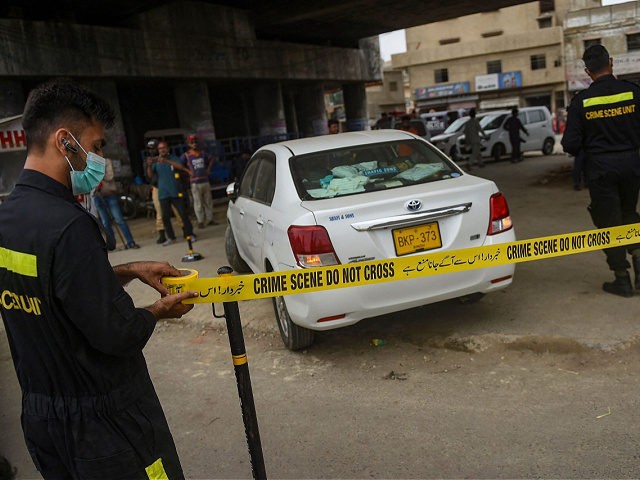A gunman believed to be a member of the Balochistan Liberation Front (BLF), a separatist terror group within Pakistan, opened fire on a vehicle carrying two Chinese nationals in Karachi on Wednesday, seriously wounding one, Pakistan’s Dawn newspaper reported on Thursday.
Karachi police officer Zawwar Husain told Dawn two Chinese men and a local driver were traveling in a vehicle in Karachi on July 28 when a separate man on a motorcycle “wearing [a] face mask opened fire on the vehicle and fled.”
One of the Chinese nationals, “identified as Yuan Chang Feng, sitting in the back seat, suffered four bullet wounds on different parts of his body while his other colleague, who was sitting next to the driver, remained safe,” according to Husain. The police officer described the shooter as a “pillion rider,” i.e. a passenger riding on the back of a motorcycle operated by a primary driver.
The second Chinese national and the car’s driver were not wounded in the shooting, according to local police.
A senior official with Pakistan’s Counter-Terrorism Department, Raja Umar Khattab, “said that the banned Balochistan Liberation Front’s spokesperson ‘Major’ Gohram through social media has claimed responsibility for the armed attack,” Dawn relayed on July 29.
“An initial police report said one of the Chinese men — listed in serious condition with three gunshot wounds — was a nuclear engineer working at the Karachi Nuclear Power Plant,” Radio Free Europe/Radio Liberty (RFE/RL) reported on July 28. “But a later police report identified both Chinese men as ‘factory workers,’ omitting the reference to the nuclear power plant.”
Karachi’s nuclear plant is currently undergoing expansion works started in 2015 as part of a $10 billion project financed by China’s government. Pakistan is a member of Beijing’s Belt and Road Initiative (BRI), which has seen China invest billions in Pakistani infrastructure in recent years. China is currently Pakistan’s single largest investor in terms of its energy and infrastructure sectors.
Beijing has focused much of its BRI investment within Pakistan on Karachi, a strategic port city located on the coast of the Arabian Sea. Karachi — itself the capital of Pakistan’s Sindh province — borders Pakistan’s Balochistan province, home to the Balochistan separatist movement behind the BLF.
BRI projects within Pakistan, especially those in Balochistan and Karachi, “have triggered discontent among some separatist groups who say local communities benefit little from the projects,” according to RFE/RL.
The Pakistani Taliban claimed responsibility for a deadly car bombing at a Balochistan hotel on April 22 that appeared to target a Chinese diplomatic delegation staying at the hotel at the time.
“China’s ambassador to Pakistan was staying at the hotel but was not there when the bomb exploded,” Pakistan Interior Minister Sheikh Rashid Ahmad told the local ARY News TV station at the time.
The explosion at the Serena Hotel in the Balochistan capital of Quetta killed at least four people and seriously injured several others. The bomb detonated “minutes before” Chinese Ambassador Nong Rong returned to the hotel, Pakistan’s Chinese Embassy told China’s state-run Global Times at the time. Ambassador Nong met with Balochistan Province Chief Minister Jam Kamal in Quetta hours before the attack.
Balochistan province borders Afghanistan and Iran and “is home to the newly expanded Gwadar deepwater port that is key to a planned $65 billion investment in China’s [regional] Belt and Road Initiative economic corridor,” Reuters reported at the time.
Wednesday’s BLF attack in Karachi follows “weeks after a bus carrying 40 Chinese workers fell into a ravine in northwest Pakistan, killing nine Chinese and three Pakistanis,” RFE/RL recalled on Wednesday.
Pakistan’s foreign ministry initially said the incident occurred due to a mechanical failure which led to “the leakage of gas that caused a blast.”
“But investigators later concluded that the bus driver had lost control after a suicide car bomber set off his explosives prematurely nearby,” according to RFE/RL. “The attack took place in Upper Kohistan, a district in the Khyber Pakhtunkhwa province that borders restive Afghanistan.”

COMMENTS
Please let us know if you're having issues with commenting.